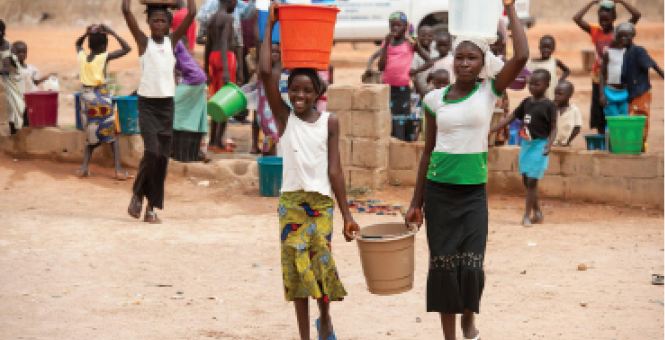Just like the air we breathe, water is crucial for sustaining human life, however, access to water supply was estimated to be 67% while that of sanitation facilities was 41% as of 2013, according to the World Health Organisation data.
An estimated 100 million Nigerians still lack basic sanitation facilities and 63 million do not have access to improved source of drinking-water hence the continuous practice of open defecation by about a third of the rural population. This has placed Nigeria among nations of the world with the highest number of people practicing open defecation.
Research has revealed that women and children, especially the girl child, are worst hit when it comes to lack of water and adequate sanitation. Access to water is a basic human rights issue that impacts women and girls the most and not having access to this essential commodity is a crisis that exacerbates the world’s most pressing problems, including national security, weak economies, deadly epidemics, and catastrophic climate change.
The Minister of Water Resources, Suleiman Adamu, during an Organised Private Sector in Water, Sanitation and Hygiene (OPS-WASH), Nigeria private sector forum on sanitation coordinated by his ministry and the United Nations Children Funds (UNICEF) with the theme ‘Coordinating Indigenous Private Sector Initiative to End Open Defecation in Nigeria’, said besides the exposure to diseases, there is a lack of dignity that is inherent in open defecation practice, particularly with regard to women and girls.
“As such, there is also the gender inequality issue which must be addressed with urgency. If effective solutions are not found, the non-availability of sanitation facilities inadvertently exposes women and girls to violence, including rape, when they are forced to go out at night to defecate in the open.”
Adamu said, water and sanitation are pivotal to achieving the Sustainable Development Goals target, adding that around 122,000 Nigerians including 87,000 children under five die each year from diarrhoea with nearly 90% of these deaths directly attributed to water, sanitation and hygiene.
UNICEF Nigeria Representative Pernille Ironside, said since the launch of the Partnership for Expanded Water, Sanitation and Hygiene (PEWASH) programme in 2016, which aims to achieve the WASH SDGs by 2030, Nigeria has recorded some successes but the rate with which these successes are realised will not enable the country to meet its 2030 targets.
She said, the private partnership engagement is needed for a ‘quantum leap’ to accelerate progress towards the SDGs, not linear progress, adding that new innovative approaches are required at a scale that will reach far more Nigerians than ever before.
“Achieving Sustainable Development Goal 6 by 2030 requires extraordinary efforts. Based on World Bank estimates, Nigeria will be required to triple its budget or at least allocate 1.7 per cent of the current Gross Domestic Product to WASH.
“The ambition is highest for rural sanitation where the gap for improved services is 64.1 per cent. Funding for the sub-sector is weak, and significant household contribution is needed to eliminate open defecation despite low family incomes.”

 Join Daily Trust WhatsApp Community For Quick Access To News and Happenings Around You.
Join Daily Trust WhatsApp Community For Quick Access To News and Happenings Around You.


